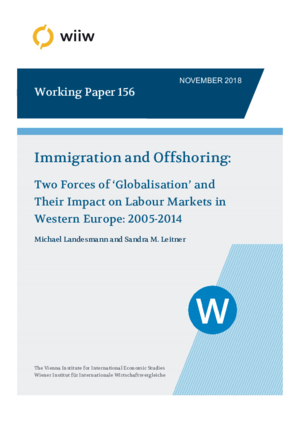Immigration and Offshoring
Michael Landesmann and Sandra M. Leitner
wiiw Working Paper No. 156, November 2018
39 pages including 11 Tables and 5 Figures
Two Forces of ‘Globalisation’ and Their Impact on Labour Markets in Western Europe: 2005-2014
This paper investigates with a joint approach the impact of immigration and different measures of ‘offshoring’ on the labour demand and demand elasticities of native workers in four different occupational groups: managers/professionals, clerks, craft workers and manual workers. It shows that of all measures of globalisation considered immigration has the most consistent and strongest negative effect on the employment of native workers, particularly on managers/professionals, clerks and manual workers. The employment effects of offshoring differ by the measure used and are positive for craft workers but, in contrast to what is typically found in the literature, negative for the high-skilled group of managers/professionals. Furthermore, immigration and offshoring both impact on natives’ labour demand elasticities but the effect differs by occupational group. Thus, while the immigration of craft workers reduces labour demand elasticities for native craft workers, the immigration of managers/professionals and clerks has the opposite effect on native workers in the same occupations. Furthermore, we test for cross effects of migration and outsourcing between the different occupational groups.
Keywords: offshoring, immigration, labour demand, labour demand elasticity, occupations
JEL classification: F16, F22, F66
Countries covered: Austria, Belgium, Denmark, Finland, France, Germany, Ireland, Italy, Netherlands, Sweden, United Kingdom
Research Areas: Labour, Migration and Income Distribution, International Trade, Competitiveness and FDI
